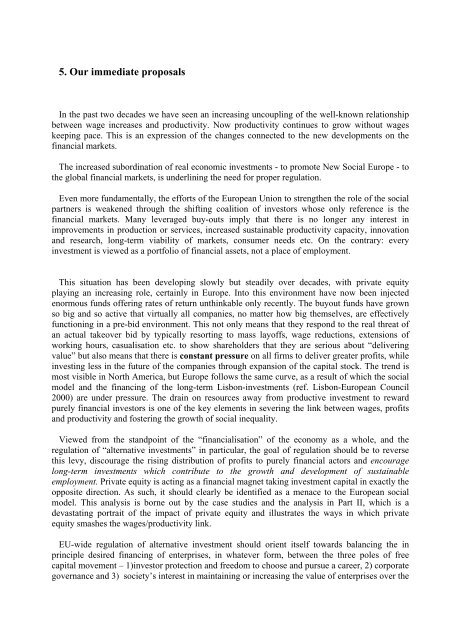Executive summary - Udo Bullmann
Executive summary - Udo Bullmann
Executive summary - Udo Bullmann
- No tags were found...
Create successful ePaper yourself
Turn your PDF publications into a flip-book with our unique Google optimized e-Paper software.
5. Our immediate proposalsIn the past two decades we have seen an increasing uncoupling of the well-known relationshipbetween wage increases and productivity. Now productivity continues to grow without wageskeeping pace. This is an expression of the changes connected to the new developments on thefinancial markets.The increased subordination of real economic investments - to promote New Social Europe - tothe global financial markets, is underlining the need for proper regulation.Even more fundamentally, the efforts of the European Union to strengthen the role of the socialpartners is weakened through the shifting coalition of investors whose only reference is thefinancial markets. Many leveraged buy-outs imply that there is no longer any interest inimprovements in production or services, increased sustainable productivity capacity, innovationand research, long-term viability of markets, consumer needs etc. On the contrary: everyinvestment is viewed as a portfolio of financial assets, not a place of employment.This situation has been developing slowly but steadily over decades, with private equityplaying an increasing role, certainly in Europe. Into this environment have now been injectedenormous funds offering rates of return unthinkable only recently. The buyout funds have grownso big and so active that virtually all companies, no matter how big themselves, are effectivelyfunctioning in a pre-bid environment. This not only means that they respond to the real threat ofan actual takeover bid by typically resorting to mass layoffs, wage reductions, extensions ofworking hours, casualisation etc. to show shareholders that they are serious about “deliveringvalue” but also means that there is constant pressure on all firms to deliver greater profits, whileinvesting less in the future of the companies through expansion of the capital stock. The trend ismost visible in North America, but Europe follows the same curve, as a result of which the socialmodel and the financing of the long-term Lisbon-investments (ref. Lisbon-European Council2000) are under pressure. The drain on resources away from productive investment to rewardpurely financial investors is one of the key elements in severing the link between wages, profitsand productivity and fostering the growth of social inequality.Viewed from the standpoint of the “financialisation” of the economy as a whole, and theregulation of “alternative investments” in particular, the goal of regulation should be to reversethis levy, discourage the rising distribution of profits to purely financial actors and encouragelong-term investments which contribute to the growth and development of sustainableemployment. Private equity is acting as a financial magnet taking investment capital in exactly theopposite direction. As such, it should clearly be identified as a menace to the European socialmodel. This analysis is borne out by the case studies and the analysis in Part II, which is adevastating portrait of the impact of private equity and illustrates the ways in which privateequity smashes the wages/productivity link.EU-wide regulation of alternative investment should orient itself towards balancing the inprinciple desired financing of enterprises, in whatever form, between the three poles of freecapital movement – 1)investor protection and freedom to choose and pursue a career, 2) corporategovernance and 3) society’s interest in maintaining or increasing the value of enterprises over the





